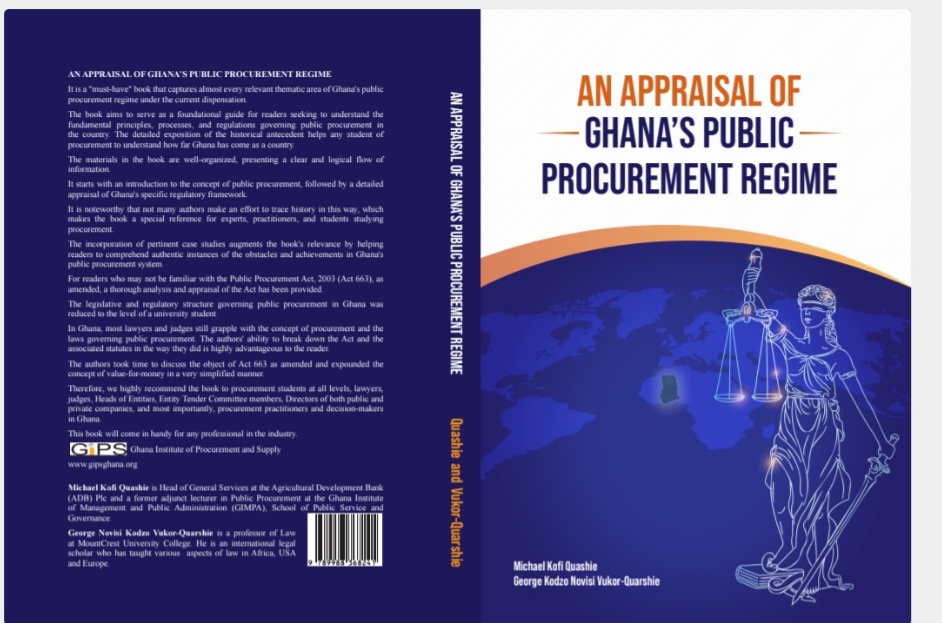Public procurement is the process by which a government ministry, department, agency, public board, corporation, other statutory institution, metropolitan, municipal, or district assembly undertakes directly related activities expected to result in economic, effective and efficient procurement.
Ghana spends about 11% of the country’s Gross Domestic Product (GDP) on procurement and delivery of goods, works and services to its people. Public procurement thus constitutes a significant amount of the government of Ghana’s expenditure.
Ghana’s Public Procurement Act, 2003, (Act 663 amended), hereinafter referred to as Act 663, is the primary legal instrument for the regulation of public procurement of goods, works and services in Ghana. The object and aim of Act 663 is to ensure that public procurement secures judicious, economic and efficient use of state resources, and that procurement is carried, out in a fair, transparent, non-discriminatory, environmentally and socially sustainable manner.
Act 663 provides, among other things, for the establishment of the Public Procurement Authority (PPA) as regulator of public procurement in Ghana. The PPA has the primary responsibility to ensure that the provisions of Act 663 are duly complied with by all parties during the procurement process. This is to ensure that the procurement process achieves direct positive impact on the successful delivery of government projects, such as construction of road by a contractor, supply of textbooks by a supplier, the provision of waste management services by a waste management firm, or architectural services by an architectural firm.
Ghana’s public procurement system allows for a large degree of decentralisation in the performance of the procurement function by procurement entities. The Act has made provision for the head of the public procurement entity to establish a procurement unit. The unit is to assist the head of entity in the performance of the procurement function. Procurement decisions are taken and implemented by the entities themselves, thus eliminating the risk of imposition of arbitrary procurement decisions on the procurement entity by a central authority.
Subsequent to the above, the Act has prescribed the utilisation of different procurement methods by procurement entities for the procurement of goods, works and services. This is to enable the entities to achieve the best combination of cost, quality and sustainable procurement for the country.
The Act has also mandated the PPA, acting through the governing BOARD, to be solely responsible for granting approval to procurement entities to utilise two procurement methods namely; i) single-source ii) restricted tendering for public procurement. This is to ensure strict compliance in the utilisation of these two highly sensitive procurement methods.

In addition to the above, the Act has provided for the establishment of entity tender committees, and tender review committees. These committees are oversight committees for the procurement process, and are therefore mandated by the Act to ensure strict compliance with the procurement laws. This arrangement is to allow for procurement requirements to be met, and at the same time for appropriate controls to be exercised over the public procurement function.
Act 663 also makes provision for rules and regulations, such as those for the preparation of procurement plan, prequalification, qualification of tenders, rejection of tenders, and record of procurement proceedings, aimed at facilitating the public procurement process. This has led to the development of guidelines as well as standard tender documents by the PPA to aid efficient and effective public procurement practice in Ghana.
In sum, Act 663 has largely ensured that the required policy, as well as processes and procedures aimed at ensuring that value for money is achieved in the country’s public procurement practice, are in place to facilitate the performance of critical procurement functions by the procurement entities. The abiding strength and significance of Act 663 is that it provides a legal reference point, a baseline for public procurement practice in Ghana. It is the legal standard by which the conduct of public procurement practice may be evaluated and judged.
Despite the strengths of the procurement regulatory regime as enumerated above, Ghana’s public procurement is also saddled with weaknesses.
Two main weaknesses of Ghana’s public procurement practice have been identified by commentators and critics. These are: i) Non-compliance by procurement entities and the PPA with Act 663 ii) The inherent weaknesses of some public procurement rules and regulations.
i) Non-compliance by procurement entities and the PPA with Act 663
One of the ways and means for ascertaining compliance with the procurement law is through statutory audit of the procurement activities of public procurement entities. For example, the Ghana Audit Service conducts annual audit exercises at the various procurement entities.
The audits are to ascertain the extent of compliance with the country’s procurement laws and other relevant regulations by the procurement entities. The Auditor General’s reports have revealed situations where Act 663 has not been complied with when public procurement was undertaken.
For example, the Auditor-General’s reports from 2014 to 2022 had reported that some procurement entities had utilised the single-source method without the approval of the BOARD of the PPA. This irregularity had resulted in significant financial cost to the state.
The findings of financial loss to the state due to the use of the single-source method instead of competitive tendering is not surprising as many writers have highlighted possible negative consequences of this public procurement option.
Investigations conducted by the Commission on Human Rights and Administrative Justice (CHRAJ) revealed that the PPA had on occasions overlooked the provisions of Act 663, when granting approval to the procurement entities for the utilisation of the restricted tendering methods.
The PPA has also in certain situations granted approval for procurement entities to utilise the single-source method without meeting the preconditions required by the Act for the utilisation of the method. The procurement entities on their part, have more often than not failed to comply with the provisions of the Act, when they apply to the PPA for approval to utilise the single-source and restricted tendering methods.
Both the PPA and the procurement entities seem to enjoy the sweet forbidden fruit of non-compliance with Act 663, and thereby indulge with glee in the sweet sin against Ghana’s public procurement regulation without paying the price.
The provisions in Act 663 are not to be treated as “mere suggestions”, which public procurement practitioners may choose to follow and ignore whimsically, given the important role that public procurement of goods, works, and services play in the economic life and welfare of Ghanaians.
ii) The inherent weaknesses of some public procurement rules and regulations
As was noted there are inherent weaknesses of some public procurement rules and regulations in Ghana’s public procurement regime. For example, there is no provision in Act 663 for the procurement entity to publish a public notice before utilising the restricted tendering method. This situation does not make it possible for the public to comment on, or make an offer for the procurement opportunity.
It also denies tenderers, who are not invited by the procurement entity to submit tenders, when the restricted tendering method is utilised, the opportunity to compete for the procurement opportunity. These tenderers may have the required capability and capacity to be competitive if invited to do so. In one such instance, a procurement entity decided to utilise the restricted tendering method for the procurement of five (5) pieces of coin sorter machines, estimated at a cost of €400,000(four hundred thousand euros).This situation could be discriminatory against tenderers, who are competitive but were not invited by the procurement entity to make offers for the supply of the machines.
Secondly a public notice prior to the procurement of the coin sorter, would have resulted in maximisation of competition by the public for the procurement opportunity, with the attendant advantage for the procurement entity to obtain value for money for the procurement of the machines.
The UNCITRAL Model Law 2011 requires that the procurement opportunity must first be published before the utilisation of the restricted tendering method by the procurement entity. I believe this provision in the model law makes the procurement process more transparent, since it allows for public comment after the publication of the notice.
There are also weaknesses inherent in some of the preconditions to be met before the utilisation of the single-source method in Ghana’s public procurement.
To begin with, Act 663 makes provision for the use of single-source method for urgent procurement owing to a catastrophic event. This precondition, however, does not require that an assessment needs to be undertaken by a designated officer in the procurement entity, to determine the most appropriate method to be utilised to meet the urgent procurement requirement due to the occurrence of a catastrophic event.
Under Tanzania’s procurement regulations the emergency situation does not require automatic resort to the utilisation of the single-source method. The regulations provide that an officer is designated to assess an emergency situation in order to determine the most appropriate method of procurement to be utilised under the circumstance.
Act 663 also provides that the single-source method could be utilised, where the procurement entity determines that the method is the most appropriate for procurement that concerns national security. This highly sensitive precondition, in my opinion, does not seem to distinguish between procurement for security purposes, which involves classified information, and those that do not.
It must be noted that the Model law 2011 provides for utilisation of single- source by the procurement entity, where the requirement is of essential security interest to the state, and not because the procurement entity determined that single-source method is the most appropriate method for security purposes. Transparency International reported that single-source defence contracts can lead to greater risk of corruption (Transparency International 2014). Pyman et al. (2009) quoted an IMF report (Gupta et al.2000) to emphasise the point that procurement is a channel through which corruption might affect military expenditures……………………
These and other related public procurement issues are thoroughly discussed in the new publication, “An Appraisal of Ghana’s Public Procurement Regime”, written by Michael Kofi Quashie, a procurement expert and Professor George K.N. Vukor-Quarshie, a law Professor.
The book is currently on sale at Kingdom Books and Stationery and some selected books shops in Ghana as well as on virtual platforms such as Amazon and BookNook Store.
Michael Kofi Quashie, the writer, is a procurement expert
Latest Stories
-
I want to focus more on my education – Chidimma Adetshina quits pageantry
3 hours -
Priest replaced after Sabrina Carpenter shoots music video in his church
3 hours -
Duct-taped banana artwork sells for $6.2m in NYC
3 hours -
Arrest warrants issued for Netanyahu, Gallant and Hamas commander over alleged war crimes
3 hours -
Actors Jonathan Majors and Meagan Good are engaged
3 hours -
Expired rice saga: A ‘best before date’ can be extended – Food and Agriculture Engineer
3 hours -
Why I rejected Range Rover gift from a man – Tiwa Savage
3 hours -
KNUST Engineering College honours Telecel Ghana CEO at Alumni Excellence Awards
4 hours -
Postecoglou backs Bentancur appeal after ‘mistake’
4 hours -
#Manifesto debate: NDC to enact and pass National Climate Law – Prof Klutse
4 hours -
‘Everything a manager could wish for’ – Guardiola signs new deal
4 hours -
TEWU suspends strike after NLC directive, urges swift resolution of grievances
4 hours -
Netflix debuts Grain Media’s explosive film
5 hours -
‘Expired’ rice scandal: FDA is complicit; top officials must be fired – Ablakwa
5 hours -
#TheManifestoDebate: We’ll provide potable water, expand water distribution network – NDC
6 hours

